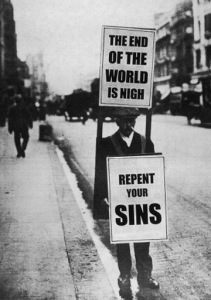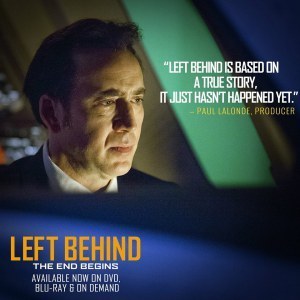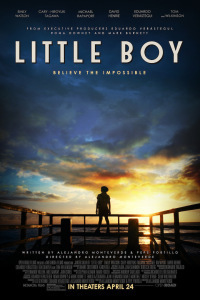Nate Fleming's Blog, page 27
April 28, 2015
The End is Near… or is it?
 Lots of American Christians seem to be afraid that what is happening in America these days proves that the End Times are upon us.
Lots of American Christians seem to be afraid that what is happening in America these days proves that the End Times are upon us.
To anyone who is concerned about that, consider this: there are roughly 300 million Americans and seven billion of everyone else. This means that the United States is about 4.3% of the world’s population.
To take it a bit further, of the 300 million people in America, about 200 million identify as Christian. Of the world’s seven billion, roughly two billion identify as Christians.
That means that what is currently happening to Christians in America is happening to 2.8% of the world’s Christian population. There are lots and lots of Christians in the world who have experienced worse, and more of it.
Jesus can come back any day, of course, but I don’t think we necessarily need to base our concern about that on what we see on the daily American news. ��The end has been near for a long, long time.


April 26, 2015
Nine Things I Learned from 40 Days (and Nights) of Christian Media. Yes, it’s over.

Media cloud, VLADGRIN / Shutterstock.com
On March 12, I made the decision to consume nothing but Christian media for forty days and to document the experience. ��I wasn’t angling for a book deal, or trying to increase revenue by upping clicks on my blog (I make no money off of this blog). ��I just wanted to see what would happen if I restricted myself to a steady diet of media created by Christians, for Christians, the kind you could only buy from a Christian bookstore.
Would I grow in some way? ��Spiritually? ��Physically? ��Mentally? ��Would it somehow make me into a more sincere and effective Christian? ��Would I snap and throw my laptop from my 16th floor balcony?
Well, as of today (due to some international travel that messed up the days a bit) those forty days are finally over, and while I did have to get a new laptop, it was because of catastrophic systems failure in the old one, and not because of a Christian-media-induced mental breakdown.
And that sound you hear is me, breathing.
Deep breaths.
Deep, cleansing, cautious breaths.
My first official non-Christian-made media as I’m coming off the forty days? ��Hans Zimmer’s Interstellar soundtrack.
Man, I missed me some Hans Zimmer.
Yesterday, my wife asked me if I’d learned anything over the past forty days, and I’d like to answer her question here, for anyone to see.
LESSONS LEARNED FROM THE 40 DAYS (AND NIGHTS) OF CHRISTIAN MEDIA CHALLENGE
Over the past 40 days…
1. ��You take the good, you take the bad…
I have learned that, like with regular media, there are some really good bits of Christian media and there are some incredibly horrid bits. ��The incredibly��horrid bits are typically the ones that get the most attention and marketing money, and get sold by Christian retailers. ��The really good bits are typically harder to find, but it’s worth the effort.

Balaam and the angel, painting from Gustav Jaeger, 1836.
2. ��The Balaam’s Donkey Effect
I have learned to my surprise that God even uses the incredibly horrid bits of Christian media to encourage people. ��I have no idea why He does this, but��I call it The Balaam’s Donkey Effect.
As Rich said, you never know who God is gonna use.
3. ��Misuse of The Balaam’s Donkey Effect
I have learned that some Christian media producers take the Balaam’s Donkey Effect to mean that you can produce media with good intentions alone and God will bless it because of those good intentions.
They seem to forget that the Bible has a lot to say about excellence.
4. ��The True Salt and Lighters
I have learned that there are Christian producers of media, true “salt and lighters”, working very hard within traditional media companies to produce great work that is not necessarily obviously Christian.
I’ve also learned that these people��don’t get near the attention from within the church as do the obvious Christian media producers.
And this is going to be hard to hear, but I think that it needs to be said: ��I have concluded that��this is really stupid and short-sighted on the part of the church.
Church, pay special attention to the following statement, because it is a message for you:��Support Christians working in non-Christian media companies like they are missionaries, because that’s what they are. ��
“But my denomination doesn’t send out missionaries to Hollywood or Nashville. ��How do we know who they are?”
Easy. ��Do some research. ��They’re not hard to find.
And once you do find them, support them with prayers and finances. ��Have a Sunday School class adopt them, and send them Amazon gift cards. ��Remember their kid’s birthdays. ��If they live close, invite them out to dinner and let them talk about their projects. ��Creatives love talking about the things they are trying to do. ��In short, treat them the way you do your missionaries to Africa and Asia and Latin America. ��They are in a mission field that is just as challenging in many ways.
And lastly on this point, don’t just find and support the people working in the more visible fields of Christian media (the authors, the singers, the directors, and such), but also the ones who work behind the scenes (the sound engineers, the DPs, the editors, the key grips, and so on). ��It’s just as hard to be a Christ-following techie in media as it is to be a celebrity. ��Maybe harder.
5. ��The Dreaded Christian Bubble
I have learned that our Christian sub-culture bubble is arguably un-Biblical. ��We weren’t called to be hermits living in caves. ��How can we show we’re not of the culture unless we’re engaged with the culture?
Recently I was involved in a discussion with a somewhat well-known Christian filmmaker, who stunned me when he said that he’d not actually watched any non-Christian movies in his life.
In. His. Life.
Not even the “safe” non-Christian movies. ��He didn’t see any need to expose himself to the films of the world, and didn’t think that it affected his own filmmaking abilities.
Romans 14 tells me that I have to respect this man’s convictions on watching films, and so I do, from a brother-in-Christ point of view. ��From a filmmaking point of view, I will be really surprised if he ever actually makes an all-around decent movie. ��The odds are stacked against him, since��he’s cut himself off from the professional influence of people who really know how to make films.
And we see Christians encasing themselves in bubbles all over the place. ��We need to pop those bubbles.
6. ��The Need for Christian Media for Christians
I have learned to respect the need for Christian-made media that is made specifically for Christians. ��It’s quite nice that we can watch television and surf the internet and listen to music, just like non-Christians do, and grow in the faith.
But I do wish a couple of things would happen with this media:
First, I��wish that the ones making media for the Christian subculture would just acknowledge they are making media for��Christians rather than pretending that their work is��making any substantial positive impact on the wider culture.����The Balaam’s Donkey Effect notwithstanding,��I’m talking about being honest and open about the demographics you honestly think you will reach. ��The majority of non-Christians in the world have a very low opinion of our music, our movies, and our books. ��We need to face that fact.
Second, I wish the��ones making media for the Christian subculture��would��challenge��the Christian subculture more, and not just hit all the right beats to make it suitably digestible. ��Doesn’t 2 Timothy say something about itching ears?
 7. ��Family Friendly����� Faith Based
7. ��Family Friendly����� Faith Based
I have learned that we should��– for once and for all – draw a big fat line between “family-friendly” and “faith-based”. ��I’ve made this point on the blog before, but over the last forty days I found myself longing for a faith-based film that was willing to plumb the depths of the human condition as well as explore the heights, and only found it with The Song. ��Faith-based films should be allowed to go mature and dark in order to truly show the light.
Where��is��the Christian-made Calvary? ��Where is the Christian-made Shawshank Redemption? ��Unforgiven? ��Schindler’s List? ��For that matter, why did we need Angelina Jolie to make a decent (if incomplete) version of Unbroken?
The problem is that we’ve shackled family-friendly and faith-based together, and in the process we’ve cut ourselves off from being able to make really good drama. ��Only a non-Christian can really tell our stories well, and then we get upset when they don’t tell them the way we want them to be told.
8. ��Fear Not
If��I can judge the state of the 21st American Christian church by the state of her media, I’ve learned that we Christians seem to be afraid. ��Of all sorts of things.
We’re afraid of homosexuals, Muslim radicals, bad parenting, Hollywood,��video games, illegal immigrants, the dark side of the internet,��atheist filmmakers making Bible epics, the other side of the political aisle gaining political power, magic, public education, higher education, and losing our American freedoms and rights. ��To name just a few things.
 Don’t get me wrong. ��Of course��we should be concerned about the issues. ��Of course��we should��learn��what’s going on so that we can pray about things.
Don’t get me wrong. ��Of course��we should be concerned about the issues. ��Of course��we should��learn��what’s going on so that we can pray about things.
But we shouldn’t��be afraid.
“For God has not given us a spirit of fear, but of power and of love and of a sound mind.” (2 Timothy 1:7)
If we truly believe that God is sovereign, then we should live with hopeful anticipation about what He is doing in the world, not in fear that He’s somehow losing control.
9. ��The Heart of the Matter
Finally, the most important thing I’ve learned over the past forty days is the importance of starting the day in God’s Word. ��I’ve mentioned a couple of times over these past 40 days that I’ve been utilizing the daily devotional written by Skye Jethani, and I highly recommend it.
If you are a Christian who��–��like me��–��loves secular media, I strongly urge you to make it a point to start your day in the presence of your heavenly Father. ��This will better enable you to meet the challenges found in trying to swim in the tsunami of secular media, and will infuse you with the grace to step into the stream��of Christian-made media with understanding and patience.
There are plenty of Christians around the world for whom the Bible is literally the only Christian media they have exposure to, and guess what?
They survive.
And in my opinion, they’re probably a lot better off than the rest of us.
—
Thanks to all who joined me in this forty day adventure in odyssey. ��Come back for my next challenge, The 40 Days (and Nights) of Star Wars Media Challenge.
I’ve got a bad feeling about this…


April 22, 2015
Day 35 • The 40 Days (and Nights) of Christian Media Challenge
I want to start day 35 of the 40 Days (and Nights) of Christian Media Challenge with something positive.
Over the past month I’ve been enjoying reading about the resurgence of Christian artists trying to create things of lasting beauty that engage people’s hearts and minds, rather than just creating media tracts to churn out the four spiritual laws.
In support of this idea, I was referred to this worthwhile article by a friend, and would commend it to my readers here.
Presentational Art vs. Representational Art by Joshua Gibbs
“…the difference between good art and sensual trash is principally seen in the responses any given piece calls forth from us. Sensual trash can only be discussed immediately afterwards, while good art can only be discussed at a much later point.”
—
On a less sunny note, I had a couple of Facebook posts come across my screen today that made me feel somewhat depressed as I near the end of my Christian media challenge.
First, let me say that I like the guys at Christiancimema.com. They were kind enough to offer me access to their library for the duration of my challenge (which I was unable to accept, because of being in China and all), and I think they provide a good and important service, alerting people to news in the world of Christian-made film.
But I was really irritated by this attempt to gain attention for a movie.
I really, really dislike when people use things like “support the troops” and “do you love Jesus?” to try and motivate people to like/buy/use products. To me, it’s manipulative and takes something of immense worth and transforms it into trite salesmanship. And it’s something that we Christians do all the time with our pearl of great price. (See my last post regarding the branding of the faith).
And why does my support of the American military have to be displayed by my supporting a film that I haven’t seen yet? How do I know that I will agree with this film? How do I know that it will do anything to encourage the men and women serving in the armed forces?
And yet the post has been liked 570 times and shared 207 times.
Things like this make me understand why Jesus referred to us as sheep.
—
The second Facebook post I want to mention was this one, from the guys who made the award nominated Nicolas Cage Left Behind film.
Let that sink in. Christians who vote on this sort of thing voted Left Behind as the best action film of 2014.
Left Behind. This Left Behind.
Left Behind as a better action film than Captain America: Winter Soldier, or Hunger Games: Mockingjay Pt. 1.
I’m thinking of a particular Forrest Gump quote right now that I just won’t quote, but you might be able to guess.
—
Finally, I’m considering doing something different, and want to get feedback from anyone who is still reading these updates.
I’m thinking of opening myself up these last five days, exposing myself to media that is not made explicitly for the evangelical American Christian audience, but media that has intrinsic Christian value, whether Christian-made or not. The point of this would be to compare the media that I’ve been consuming, media that is made with an evangelical agenda with media that is made for the sake of exploring the human condition, that communicates the truth of the Gospel message in the process.
Thoughts? Recommendations?


Day 35 ��� The 40 Days (and Nights) of Christian Media Challenge
I want to start day 35 of the 40 Days (and Nights) of Christian Media Challenge with something positive.
Over the past month I’ve been enjoying reading about the resurgence of Christian artists trying to create things of lasting beauty that engage people’s hearts and minds, rather than just creating media��tracts to churn out the four spiritual laws.
In support of this idea, I was referred��to this worthwhile article by a friend, and would commend it to my readers here.
Presentational Art vs. Representational Art by Joshua Gibbs
“…the difference between good art and sensual trash is principally seen in the responses any given piece calls forth from us. Sensual trash can only be discussed immediately afterwards, while good art can only be discussed at a much later point.”
—
On a less sunny note, I��had a��couple of Facebook posts come across my screen today that made me feel somewhat depressed as I near the end of my Christian media challenge.
First, let me say that��I like the guys at Christiancimema.com. ��They were kind enough to offer me access to their library for the duration of my challenge (which I was unable to accept, because of being in China and all), and I think they provide a good and important service, alerting people to news in the world of Christian-made film.
But I was really irritated by this attempt to gain attention for a movie.
I really, really dislike when people use things like “support the troops” and “do you love Jesus?” to try and motivate people to like/buy/use products. ��To me, it’s manipulative and takes something of immense worth and transforms it into trite salesmanship. ��And it’s something that we Christians do all the time with our pearl of great price. ��(See my last post regarding the branding of the faith).
And why does my support of the American military have to be displayed by my supporting a film that I haven’t seen yet? ��How do I know that I will agree with this film? ��How do I know that it will do anything to encourage the men and women serving in the armed forces?
And yet the post has been liked 570 times and shared 207 times.
Things like this make me understand why Jesus referred to us as sheep.
—
The second Facebook post��I want to mention��was this one, from the guys who made the award��nominated��Nicolas Cage Left Behind film.
Let that sink in. ��Christians who vote on this sort of thing voted Left Behind as the best action film of 2014.
Left Behind. ��This Left Behind.
Left Behind as a better action film than Captain America: Winter Soldier, or Hunger Games: Mockingjay Pt. 1.
I’m thinking of a particular Forrest Gump quote right now that I just won’t quote, but you might be able to guess.
—
Finally, I’m considering doing something different, and want to get feedback from anyone who is still reading these updates.
I’m thinking of opening myself up these last five days, exposing myself to media that is not made explicitly for the evangelical American Christian audience, but media that has intrinsic Christian value, whether Christian-made or not. ��The point of this would be to compare the media that I’ve been consuming, media that is made with an evangelical agenda with��media that is made for the sake of exploring the human condition, that communicates the truth of the Gospel message in the process.
Thoughts? ��Recommendations?


April 20, 2015
Spend a little time with Rich Mullins.
April 19, 2015
Branding the Christian Faith • 40 Days (and Nights) of Christian Media • Day 32

Consumer Jesus by Bangsy
Branding Christianity.
As I enter the home stretch of my 40 Days (and Nights) of Christian Media Challenge, I’m struck by the irritating oxymoron that we sell our Christian faith as just another brand on the shelf.
But before I get into that, I want to consider the concept of branding as a practice.
I just returned from a week in Arizona with my Chinese and Korean elementary and middle school students (yeah, I know… the world’s coolest field trip) and seeing my home country through their eyes, I was struck by how intently everyone and everything is branded.
For example, the boys in my group desperately wanted to get to clothing shops like Hollister’s, because the Hollister’s brand is so popular among a segment of youth in China. They also wanted Gap, Target, Sketchers, Abercrombie and Fitch, and others. But it wasn’t just clothing, because when we took them out to eat, they wanted to try the branded restaurants – Chipotle, Cracker Barrel, Red Robin, etc. The one notable exception was the non-franchised generic Chinese restaurant we took them to so that they could experience Americanized Chinese food (which is almost a brand unto itself), and which they loved, to my amazement.
On the one hand, branding makes sense. You know that you’re going to get the same quality product no matter where you are. A Starbucks in Phoenix is the same as a Starbucks in Shenzhen. The Apple computer you buy in Richmond is going to be the same as the Apple computer you buy in Hong Kong. There’s a comfort in that fact. There’s security in that fact.
And isn’t that what we’re after in life? Comfort and security?
[On a side note, this recent exposure to the concept of branding makes me think my next 40 day challenge should be to try and live a brand-free life. But I digress…]
 Branding has worldwide power and influence, and so it comes as no surprise that the faithful would seek to take the Christian faith and turn it into another brand on the marketplace. Want a hamburger? Go to McDonalds. Want to be entertained? Go see the latest Disney movie. Want spiritual salvation? Why not try brand Jesus?
Branding has worldwide power and influence, and so it comes as no surprise that the faithful would seek to take the Christian faith and turn it into another brand on the marketplace. Want a hamburger? Go to McDonalds. Want to be entertained? Go see the latest Disney movie. Want spiritual salvation? Why not try brand Jesus?
The problem is that the practice of branding the faith has led to the less-than-stellar state of Christian media that we experience today. And yes, after the past 32 days, I can testify that Christian media, even made with the best of intentions, is less-than-stellar.
After all, branding brings comfort and security.
Branding doesn’t encourage risk and asking difficult questions.
And while Christianity does both of those things, most of our media does not.
For a good example of where I’ve seen this, during my week in Arizona I didn’t have time to expose myself to much Christian media. We were running all day and night (not just shopping, by the way), and the only place I could find Christian media was while driving the van from place to place, in the form of Christian radio “family-friendly” radio stations, stations that are infamous for trying to appeal to the “Becky” demographic archetype.
Not surprisingly, I was completely underwhelmed by what I found there. But, I’m not a middle-aged soccer mom, so maybe I shouldn’t be surprised that it didn’t surprise me.
Here’s the rub with my response to Christian family-friendly music: I personally know a few Christian musicians and songwriters, and they are – without a doubt – talented people. In fact, the ones I know have more talent in their little toe than I have in my entire body. And yet, popular Christian family-friendly music, the kind you hear on our radio stations, arguably the most visible (audible?) part of the Christian brand, is just… bland.
Uninteresting. Predictable. Over-produced. Safe.
And those are not words that I would use to describe the Christian faith.
It seems like Christian music makers are limited by the restraints put on them by the Christian Industrial Complex, which tries to please a certain demographic, and that makes me sad.
But then, that’s the whole concept behind branding, isn’t it?
This practice also underscores my argument that the last thing that Christian filmmakers need to do is allow their craft to be pigeon-holed into some sort of Christian filmmaking industry. Because at the end of the day, you can be the most talented filmmaker of your generation, but if you have suits from the Christian Industrial Complex above you dictating what you have to do and what you can’t do in order to fit the niche audience’s needs, you will never make a movie that rises above the level of bland.
But again, it all comes back to the bad idea of the creation of Christian brands in the first place.
Can you imagine if the writers and characters of the Bible had been restricted by 21st century evangelical faith-based branding? If the Christian Industrial Complex had had a hand in what we read today when we open our Bibles?
I think our Scriptures might have been pretty different. For example…
 • Adam and Eve would have been created wearing modest clothing, and the couple would probably also have been wearing complementary Lord’s Gym and His Pain Your Gain t-shirts.
• Adam and Eve would have been created wearing modest clothing, and the couple would probably also have been wearing complementary Lord’s Gym and His Pain Your Gain t-shirts.• The story of Noah would have been a nice story about a kindly old man who builds a big boat filled with animals, and saves them from a flood. There wouldn’t be anything about worldwide devastation, about the death of all other young and old living creatures. No, it would be something well suited for a Sunday School flannelgraph.
• Forget the whole Noah post-flood-getting-drunk-on-homemade-wine thing. Welch’s grape juice, maybe, but definitely not homemade wine, and definitely not to the point of getting drunk.
• Abraham would have proudly told Pharaoh that Sarai was his wife, showing the power of his faith, the strength of his convictions, and his respect for the sanctity of marriage. Then he might have been invited by Pharaoh to speak at the annual Egyptian Men’s Conference.
• The Israelites would have shown much more faith as they wandered in the wilderness. Making the golden calf? Out! Complaining about manna? Forget it! Being killed by snakes for their unfaithfulness? Wouldn’t happen! They would have been a much more faithful lot, and then Moses would have gotten to go to the promised land, too.
 • David dancing naked into the city after the return of the Ark of the Covenant? Are you kidding me? First of all, he wouldn’t have danced. Second, he would have been wearing suitable clothing, including quite possibly the Jesus, Sweet Savior t-shirt along with a respectful pair of dungarees.
• David dancing naked into the city after the return of the Ark of the Covenant? Are you kidding me? First of all, he wouldn’t have danced. Second, he would have been wearing suitable clothing, including quite possibly the Jesus, Sweet Savior t-shirt along with a respectful pair of dungarees.
• Speaking of David, he wouldn’t have had the whole embarrassing Bathsheba affair. But if it had to happen, then he would have been excused from his role in leadership until a proper amount of time had passed, and then he would have been allowed back, properly contrite, having learned a valuable lesson, and he would have written a book about his experiences.
• Song of Solomon? With all that sexual content? Not a chance.
• And don’t get me started on the prophets. There would be some serious retooling of those stories needed to make them more palatable to Becky and her friends.
So, what do we do?
Knowing that The Christian Industrial Complex is out there, researching us, trying to figure out what it is that will motivate us to use their services or buy their products, just like Apple, just like Coca-Cola, just like every other branded producer on the marketplace? What do we do?
It’s really quite simple. We make a concerted, focused effort to grow in the Christian faith – apart from The Christian Industrial Complex.

Christian publishers, a Duck Dynasty Bible is too much. Way, way too much. Seriously.
And that means we need to take a page from the Reformation and learn to study God’s word for ourselves. We don’t need to depend on study Bibles written by the celebrity pastors, famous singers, or even famous duck call salesmen.
Not that the celebrity pastors can’t write worthwhile stuff. Of course they can. But we shouldn’t depend upon the celebrity pastors at the cost of not thinking for ourselves.
We must study the Scriptures and learn for ourselves.
The problem is that we’re not doing this.
Last year, Lifeway Research (admittedly part of the CIC) concluded that 19% of American churchgoers read the Bible every day, 26% a few times a week, 14% once a week, 22% once a month, and 18% never read it.
No wonder we’re settling for what The Complex serves us, because we’re not growing in our faith on our own! We’re expecting others to feed us, and we’re not interested in working for it ourselves.
But here’s the kicker – we’re told very specifically in Philippians that we are to be working out our salvation with fear and trembling! That doesn’t give the impression that we’re to be concerned with comfort and security, but that we’re supposed to be working! Yes, it’s work, and it can be scary business, if you’re doing it right. It’s unsettling! It’s not at all simple!
And the branding of the Christian faith is just the opposite.
—
And meanwhile, here I sit, with eight days left on my challenge. To be honest, I’m really, really looking forward to this challenge being over. I think I can handle Christian media when I take it in bite-sized chunks, but when I consume nothing else each day, it’s too much.
I long for a Sacred Arts Revolution.
But it’s not all dark, creatively. There have been some hopeful signs I’ve found in the world of media (specifically music) being made by Christians, but typically outside of the Christian Industrial Complex.
Enjoy Mutemath, Future of Forestry, and Audrey Assad.


Branding the Christian Faith ��� 40 Days (and Nights) of Christian Media ��� Day 32

Consumer Jesus by Bangsy
Branding Christianity.
As I enter the home stretch of my 40 Days (and Nights) of Christian Media Challenge, I’m��struck��by��the irritating oxymoron that we sell our Christian faith as just another brand on the shelf.
But before I get into that, I want to consider the concept of branding as a practice.
I just returned from a week in Arizona with my Chinese and Korean elementary and middle school students (yeah, I know… the world’s coolest field trip) and��seeing my home country through their eyes, I was struck by how intently everyone and everything is branded.
For example, the boys in my group desperately wanted to get to clothing shops like��Hollister’s, because the Hollister’s brand is so popular among a segment of youth in China. ��They also wanted Gap, Target, Sketchers, Abercrombie and Fitch, and others. ��But it wasn’t just clothing, because when we took them out to eat, they wanted to try��the��branded restaurants – Chipotle, Cracker Barrel, Red Robin, etc. ��The one notable exception was the non-franchised generic Chinese restaurant we took them to so that they��could experience Americanized Chinese food (which is almost a brand unto itself), and which they loved, to my amazement.
On the one hand, branding makes sense. ��You know that you’re going to get the same quality product no matter where you are. ��A Starbucks in Phoenix is the same as a Starbucks in Shenzhen. ��The Apple computer you buy in Richmond is going to be the same as the Apple computer you buy in Hong Kong. ��There’s a comfort in that fact. ��There’s security in that fact.
And isn’t that what we’re after in life? ��Comfort and security?
[On a side note, this recent exposure to the concept of branding��makes me think my next 40 day challenge should be to try and live a brand-free life. ��But I digress…]
 Branding has worldwide power and influence, and so it comes as no surprise that the faithful would seek to take the Christian faith and turn it into another brand on the marketplace. ��Want a hamburger? ��Go to McDonalds. ��Want to be entertained? ��Go see the latest Disney movie. ��Want spiritual salvation? ��Why not try brand Jesus?
Branding has worldwide power and influence, and so it comes as no surprise that the faithful would seek to take the Christian faith and turn it into another brand on the marketplace. ��Want a hamburger? ��Go to McDonalds. ��Want to be entertained? ��Go see the latest Disney movie. ��Want spiritual salvation? ��Why not try brand Jesus?
The problem is that the��practice of branding the faith has led to��the less-than-stellar state of Christian media that we experience today. ��And yes, after the past 32 days, I can testify that Christian media, even made with the best of intentions, is less-than-stellar.
After all, branding brings comfort and security.
Branding doesn’t encourage risk and asking difficult questions.
And while Christianity does both of those things, most of our media does not.
For a good example of where I’ve seen this, during my week in Arizona I didn’t have time to expose myself to much Christian media. ��We were running all day and night (not just shopping, by the way), and the only place I could find��Christian media was while driving the van from place to place, in the form of��Christian radio “family-friendly” radio stations,��stations that are infamous for trying to appeal to the “Becky” demographic archetype.
Not surprisingly, I was completely underwhelmed by what I found there. ��But, I’m not a middle-aged soccer mom, so maybe I shouldn’t be surprised that it didn’t surprise me.
Here’s the rub with my response to Christian family-friendly music: ��I personally know a few Christian musicians and songwriters, and they are – without a doubt – talented people. ��In fact, the ones I know have more talent in their little toe than I have in my entire body. ��And yet, popular Christian family-friendly music, the kind you hear on our radio stations, arguably the most visible (audible?) part of the Christian brand, is just… bland.
Uninteresting. ��Predictable. ��Over-produced. ��Safe.
And those are not words that I would use to��describe the Christian faith.
It seems like Christian music makers are limited by the restraints put on them by the Christian Industrial Complex, which��tries to please a certain demographic, and that makes me sad.
But then, that’s the whole concept behind branding, isn’t it?
This practice��also underscores my argument that the last thing that Christian filmmakers need to do is allow their craft to be pigeon-holed into some sort of Christian filmmaking industry. ��Because at the end of the day, you can be the most talented filmmaker of your generation, but if you have suits from the Christian Industrial��Complex above you dictating what you have to do and what you can’t do in order to fit the niche audience’s needs, you will never make a movie that rises above the level of bland.
But again, it all comes back to the bad idea of the creation of Christian brands in the first place.
Can you imagine if the writers and characters of the Bible had been restricted by 21st century evangelical faith-based branding? ��If the Christian Industrial Complex had had a hand in what we read today when we open our Bibles?
I think our Scriptures might have��been��pretty different. ��For example…
 ��� Adam and Eve would have been created wearing modest clothing, and the��couple would probably also have been wearing complementary��Lord’s Gym and His Pain Your Gain t-shirts.
��� Adam and Eve would have been created wearing modest clothing, and the��couple would probably also have been wearing complementary��Lord’s Gym and His Pain Your Gain t-shirts.��� The story of Noah would have been a nice story about a kindly old man who builds a big boat filled with animals, and saves them from a flood. ��There wouldn’t be anything about worldwide devastation, about the death of all other young and old living creatures. ��No, it would be something well suited for a Sunday School flannelgraph.
��� Forget the whole Noah post-flood-getting-drunk-on-homemade-wine thing. ��Welch’s grape juice, maybe, but definitely not homemade wine, and definitely not to the point of getting drunk.
��� Abraham��would have proudly told Pharaoh that Sarai was his wife, showing the power of his faith, the strength of his convictions, and his respect for the sanctity of marriage. ��Then he might have been invited by Pharaoh to speak at the annual Egyptian Men’s Conference.
�����The Israelites would have shown much more faith as they wandered in the wilderness. ��Making the golden calf? ��Out! ��Complaining about manna? ��Forget it! ��Being killed by snakes for their unfaithfulness? ��Wouldn’t happen!�� They would have been a much more faithful lot, and then Moses would have gotten to go to the promised land, too.
 ��� David dancing naked into the city after the return of the Ark of the Covenant? ��Are you kidding me? ��First of all,��he wouldn’t have danced. ��Second, he would have��been wearing suitable clothing, including quite possibly the��Jesus, Sweet Savior��t-shirt along with a respectful pair of dungarees.
��� David dancing naked into the city after the return of the Ark of the Covenant? ��Are you kidding me? ��First of all,��he wouldn’t have danced. ��Second, he would have��been wearing suitable clothing, including quite possibly the��Jesus, Sweet Savior��t-shirt along with a respectful pair of dungarees.
��� Speaking of David,��he��wouldn’t have had the whole embarrassing Bathsheba affair. ��But if it had to happen, then he would have been excused from his role in leadership until a proper amount of time had passed, and then he would have been allowed back, properly contrite, having learned a valuable lesson, and he would have written a book about his experiences.
��� Song of Solomon? ��With all that sexual content? ��Not a chance.
��� And don’t get me started on the prophets. ��There would be some serious retooling of those stories needed to make them more palatable to Becky and her friends.
So, what do we do?
Knowing that The Christian Industrial Complex is out there, researching us, trying to figure out what it is that will motivate us to use their services or buy their products, just like Apple, just like Coca-Cola, just like every other branded producer on the marketplace? ��What do we do?
It’s really quite simple. ��We make a concerted, focused effort to grow in the Christian faith – apart from The Christian Industrial Complex.

Christian publishers, a Duck Dynasty Bible is too much. Way, way too much. Seriously.
And that means we need to take a page from the Reformation and learn to��study God’s word for ourselves. ��We don’t need to depend��on study Bibles written by the��celebrity��pastors, famous singers, or even famous duck call salesmen.
Not that the celebrity pastors can’t write worthwhile stuff. ��Of course they can. ��But we shouldn’t depend upon the celebrity pastors��at the cost of��not thinking for ourselves.
We must��study the Scriptures and learn for ourselves.
The problem is that we’re not doing this.
Last year, Lifeway Research (admittedly part of the CIC) concluded that 19% of American churchgoers read the Bible every day, 26% a few times a week, 14% once a week, 22% once a month, and 18% never read it.
No wonder we’re settling for what The Complex serves us, because we’re not growing in our faith on our own!�� We’re expecting others to feed us, and we’re not interested in working for it ourselves.
But here’s the kicker – we’re told very specifically in Philippians that we are to be working out our salvation with fear and trembling! ��That doesn’t give the impression that we’re to be concerned with comfort and security, but that we’re supposed to be working! ��Yes, it’s work, and it��can be��scary business, if you’re doing it right. ��It’s unsettling! ��It’s not at all simple!
And the branding of the Christian faith is just the opposite.
—
And meanwhile, here I sit, with eight days left on my challenge. ��To be honest, I’m really, really looking forward to this challenge being over. ��I think I can handle Christian media when I take it in bite-sized chunks,��but when I consume nothing else each day,��it’s too much.
I long for a Sacred Arts Revolution.
But it’s not all dark, creatively. ��There have been some hopeful signs I’ve found in the world of media (specifically music) being made by Christians, but typically outside of the Christian Industrial Complex.
Enjoy Mutemath, Future of Forestry, and Audrey Assad.


April 10, 2015
The Day Off ��� 40 Days (and Nights) of Christian Media
Warning. ��I have been awake for 34 hours.
I’m feeling pretty cranky.
 I woke up at 4:00 AM, grabbed a taxi at 5:00 PM, loaded a bus at 6:00 PM, went through the Chinese/Hong Kong borders from 7:00 PM to 7:45 PM, checked in at the Hong Kong airport at 8:30, boarded the Delta flight to Seattle at 10:05. ��Eleven and a half hours later, we touched down in Seattle, two hours later we boarded the flight for Phoenix, three hours later we landed in Phoenix. ��We met the van to take us to our rental house, went to our partner school for a delicious Mexican meal, stopped off at the grocery store to get some supplies for the morning, and finally now, 34 hours later, I’m sitting in my bed, trying to fall asleep. ��But my body thinks it’s 1:30 in the afternoon rather than 10:30 at night.
I woke up at 4:00 AM, grabbed a taxi at 5:00 PM, loaded a bus at 6:00 PM, went through the Chinese/Hong Kong borders from 7:00 PM to 7:45 PM, checked in at the Hong Kong airport at 8:30, boarded the Delta flight to Seattle at 10:05. ��Eleven and a half hours later, we touched down in Seattle, two hours later we boarded the flight for Phoenix, three hours later we landed in Phoenix. ��We met the van to take us to our rental house, went to our partner school for a delicious Mexican meal, stopped off at the grocery store to get some supplies for the morning, and finally now, 34 hours later, I’m sitting in my bed, trying to fall asleep. ��But my body thinks it’s 1:30 in the afternoon rather than 10:30 at night.
Got to love international travel.
So, as I said back at the beginning of the challenge, this was my first of two days off from the challenge (the second being my return flight next week). ��After all, I can do lots of things, but I can’t spend an 11 hour flight sitting and watching a blank screen because airlines would never carry our preachy, obvious Christian-made movies.
So, I watched three movies that were not Christian-made, and a couple of television programs.
And I was reminded once again why it’s so important that the church build up our believers in Hollywood, so that they can be making the kinds of movies that would be shown on Delta Airlines trans-Pacific flights.

(Photograph by A.Currell, Flickr)
See, there were lots and lots of unsaved souls on that��Airbus A330-200 today, and they were filling themselves up with all sorts of media that was created by lots of people, but how many Christians? ��That’s the question, isn’t it? ��Those so-called evil “Hollywood films” that we Christians love to rail against so much involve many Christians working for them, and we don’t even know about it. ��And so we don’t support their work, because they are just producing “Hollywood trash”.
Now, I would be the first to say that I don’t have it all together as a person, nor as a Christian. ��But, that being said, I sometimes wonder at the short-sightedness of my Christian brothers and sisters, that on this subject they don’t see the forest for the trees.
“Give us more preachy, obvious (and largely un-watchable) Christian-made movies,” you can almost hear them cry. ��“Whatever you do, don’t make a movie that would actually get noticed for the quality outside of our comfortable little subculture! ��That might blur the lines too much between our comfy little subculture and the evils of Hollywood!” ��Emboldened, they continue. ��“No, please, for heaven’s sake, make movies that give the message��and do whatever you want with the medium, because I really don’t care about that.�� And frankly, I really don’t care about those non-Christians who may wander into Christian-made films (since they won’t have the possibility of watching them on 11 hour airplane rides). ��They can just watch their secular movies, and hope nothing happens to their plane.”
“Now be quiet while I re-watch [insert Christian-made movie title here] for the fifth time.”
—
My apologies, dear readers. ��I’ve been awake for 34 hours, and I’m feeling pretty cranky.
I will just say this about the time spent watching the media that��Delta had to��offer – it felt very refreshing to be watching well-made movies and television once again.
26 days has been a long time.
14 days to go.
—
And by the way, Christiancinema.com recently sponsored Christian Movie Madness, where people could vote��online for their favorite films in a tournament competition similar to basketball���s March Madness. ��The movie chosen would win the title “Best. Movie. Ever.” ��Well, best Christian-made movie ever, anyway.
The results are in, and the results substantiate what I wrote here, today. ��Too many Christians (especially American evangelical Christians), don’t give a rip about the medium of a film. ��They just want the message.
*sigh*
We have a very large mountain to climb.


April 8, 2015
Rich Mullins Interview ��� Ichthus Festival, 1996
In the midst of the 40 Days (and Nights) of Christian Media Challenge, I think a little Rich is called for, as refreshment.
Sorry for the quality of the recording. ��It was, after all, the 90’s.
[on moving away from Nashville to a Navajo reservation to teach music to kids] I just kind of got tired of the white evangelical middle class sort of perspective on God and I thought maybe I would have more luck finding Christ among the pagan Navajos.
If I were going to be a good car, if Mr. Ford had invented me and I wanted to bring Mr. Ford glory, what would I do?�� I wouldn’t go conquer countries, I wouldn’t plow fields, I would simply be a car.
If I believe that God is good, which I think as a Christian we must, then I have to believe that my life is good whether or not I like it, whether or not I find it particularly pleasant or easy or exciting or what. ��If God is good, and if life is a gift that we are given from God, then I must learn to accept my life.
I kind of tend to think that we should be God’s person in the place where we are, and if God wants you to go to Egypt, he will provide eleven jealous brothers and they will sell you into slavery.
Man, I miss him.


Day 24 ��� 40 Days (and Nights) of Christian Filmmaking
 It’s been a very interesting day 24.
It’s been a very interesting day 24.
First, I started the day by wading into the American culture wars, and losing a Facebook friend over the gay wedding cake baking issue. ��My point? ��As Christians, we should consider responding to people the way Jesus responded to people, with more concern about the people we’re interacting with than our rights as Americans. ��I was disappointed that my Facebook friend – who identified as a conservative Christian – was so adamant, obstinate, and even insulting (which is what ultimately led to his de-friending me).
Conversely, I’ve been encouraged by the numbers of Christian friends who have chimed in since, recognizing that living as Christians in 21st Century America is not simple, and acknowledging that our role as followers of Jesus might take us to some uncomfortable places.
We 21st century American Christians have a really hard time divorcing our Christian faith – which should be paramount – from our American citizenship. ��Over the past few years, it seems like God may have been working pretty hard to demonstrate to us that our hope should not be in our wealth, in our security, in our political party, in��the president that we would prefer to win, or even being the dominant cultural force. ��At the end of the day, most faithful Christians in history have lived under difficult circumstances, and we shouldn’t be surprised if our experience is anything else.
In fact, we might even find that we’re growing stronger in our faith when our lives are watered with difficulties, rather than stagnating in the pools of comfort and ease, which is what most of us really want, at the end of day.
 Second, I ended the day by watching the first episode of A.D. The Bible Continues, the brainchild of Roma Downey (how did she ever go from playing an angel to being the Mother of Christian Filmmaking?) and Mark Burnett (and how did he go from Survivor to being the Papa?).
Second, I ended the day by watching the first episode of A.D. The Bible Continues, the brainchild of Roma Downey (how did she ever go from playing an angel to being the Mother of Christian Filmmaking?) and Mark Burnett (and how did he go from Survivor to being the Papa?).
I have mixed feelings about the start of this mini-series. ��On the one hand, I’m glad to see that someone with some clout in Hollywood has the courage and the vision to tackle this project. ��Nobody has really ever done what the dynamic duo is doing, and so kudos to them for the ambition. ��I’m really curious to see where they take this series, and what they do with the early church.
On the other hand, the first episode didn’t really grab me. ��It seemed rushed, in a hurry to get through the crucifixion, which hit me as odd. ��Also, I disliked the way that it was written, as if everyone really knew who Jesus really was. ��Nearly��every line seemed to be filled with the truth of Jesus’ importance, even though it hadn’t been proven yet, which made me feel like��many of the lines weren’t earned.
For example, when Pontious Pilate questioned the guard who was responsible for expediting Jesus’ death, it seemed especially pointed that the filmmakers were trying to prove to the audience that Jesus was dead. ��It was – as they say – a lot of telling, rather than showing.
It seems like we Christians just really have trouble with writing with subtlety, don’t we?
I am going to stick with the mini-series, because I am curious where they’re heading and how they’ll get there. ��I’m expecting a lot of on-the-nose dialogue (which should please the majority of my Christian brothers and sisters, unfortunately), and I don’t expect many surprises, and��at the end of the day, I’m guessing that the mini-series will just be alright, but nothing special.
But it does give me something to watch, and for that I’m grateful.
But why – again – do people in the Bible have to speak with British accents? ��I just don’t get it. ��But at least they had some diversity in the casting!
Day 24 in the bag.
By the way… a Christian-made film I’m looking forward to?













